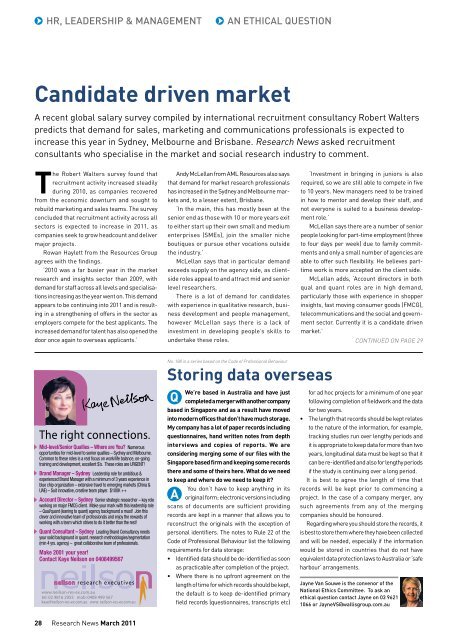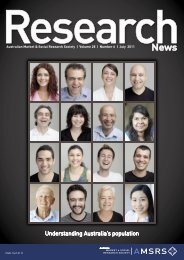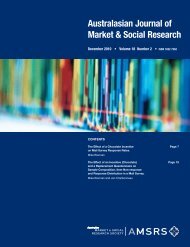Asia Pacific region - aprc-research
Asia Pacific region - aprc-research
Asia Pacific region - aprc-research
You also want an ePaper? Increase the reach of your titles
YUMPU automatically turns print PDFs into web optimized ePapers that Google loves.
HR, LEADERSHIP & MANAGEMENT<br />
AN ETHICAL QUESTION<br />
Candidate driven market<br />
A recent global salary survey compiled by international recruitment consultancy Robert Walters<br />
predicts that demand for sales, marketing and communications professionals is expected to<br />
increase this year in Sydney, Melbourne and Brisbane. Research News asked recruitment<br />
consultants who specialise in the market and social <strong>research</strong> industry to comment.<br />
The Robert Walters survey found that<br />
recruitment activity increased steadily<br />
during 2010, as companies recovered<br />
from the economic downturn and sought to<br />
rebuild marketing and sales teams. The survey<br />
concluded that recruitment activity across all<br />
sectors is expected to increase in 2011, as<br />
companies seek to grow headcount and deliver<br />
major projects.<br />
Rowan Haylett from the Resources Group<br />
agrees with the findings.<br />
‘2010 was a far busier year in the market<br />
<strong>research</strong> and insights sector than 2009, with<br />
demand for staff across all levels and specialisations<br />
increasing as the year went on. This demand<br />
appears to be continuing into 2011 and is resulting<br />
in a strengthening of offers in the sector as<br />
employers compete for the best applicants. The<br />
increased demand for talent has also opened the<br />
door once again to overseas applicants.’<br />
Andy McLellan from AML Resources also says<br />
that demand for market <strong>research</strong> professionals<br />
has increased in the Sydney and Melbourne markets<br />
and, to a lesser extent, Brisbane.<br />
‘In the main, this has mostly been at the<br />
senior end as those with 10 or more years exit<br />
to either start up their own small and medium<br />
enterprises (SMEs), join the smaller niche<br />
boutiques or pursue other vocations outside<br />
the industry.’<br />
McLellan says that in particular demand<br />
exceeds supply on the agency side, as clientside<br />
roles appeal to and attract mid and senior<br />
level <strong>research</strong>ers.<br />
There is a lot of demand for candidates<br />
with experience in qualitative <strong>research</strong>, business<br />
development and people management,<br />
however McLellan says there is a lack of<br />
investment in developing people’s skills to<br />
undertake these roles.<br />
‘Investment in bringing in juniors is also<br />
required, so we are still able to compete in five<br />
to 10 years. New managers need to be trained<br />
in how to mentor and develop their staff, and<br />
not everyone is suited to a business development<br />
role.’<br />
McLellan says there are a number of senior<br />
people looking for part-time employment (three<br />
to four days per week) due to family commitments<br />
and only a small number of agencies are<br />
able to offer such flexibility. He believes parttime<br />
work is more accepted on the client side.<br />
McLellan adds, ‘Account directors in both<br />
qual and quant roles are in high demand,<br />
particularly those with experience in shopper<br />
insights, fast moving consumer goods (FMCG),<br />
telecommunications and the social and government<br />
sector. Currently it is a candidate driven<br />
market.’<br />
CONTINUED ON PAGE 29<br />
No. 188 in a series based on the Code of Professional Behaviour<br />
Storing data overseas<br />
Mid-level/Senior Quallies – Where are You Numerous<br />
opportunities for mid-level to senior quallies – Sydney and Melbourne.<br />
Common to these roles is a real focus on work/life balance, on-going<br />
training and development, excellent $’s. These roles are URGENT!<br />
Brand Manager – Sydney Leadership role for ambitious &<br />
experienced Brand Manager with a minimum of 3 years experience in<br />
blue chip organization – extensive travel to emerging markets (China &<br />
UAE) – Suit innovative, creative team player. $100K ++<br />
Account Director – Sydney Senior strategic <strong>research</strong>er – key role<br />
working on major FMCG client. Make your mark with this leadership role<br />
– Qual/quant (leaning to quant) agency background a must! Join this<br />
clever and innovative team of professionals and enjoy the rewards of<br />
working with a team which strives to do it better than the rest!<br />
Quant Consultant – Sydney Leading Brand Consultancy needs<br />
your solid background in quant. <strong>research</strong> methodologies/segmentation<br />
(min 4 yrs. agency) – great collaborative team of professionals.<br />
Make 2001 your year!<br />
Contact Kaye Neilson on 0408499567<br />
www.neilson-res-ex.com.au<br />
We’re based in Australia and have just<br />
completed a merger with another company<br />
based in Singapore and as a result have moved<br />
into modern offices that don’t have much storage.<br />
My company has a lot of paper records including<br />
questionnaires, hand written notes from depth<br />
interviews and copies of reports. We are<br />
considering merging some of our files with the<br />
Singapore based firm and keeping some records<br />
there and some of theirs here. What do we need<br />
to keep and where do we need to keep it<br />
You don’t have to keep anything in its<br />
original form; electronic versions including<br />
scans of documents are sufficient providing<br />
records are kept in a manner that allows you to<br />
reconstruct the originals with the exception of<br />
personal identifiers. The notes to Rule 22 of the<br />
Code of Professional Behaviour list the following<br />
requirements for data storage:<br />
• Identified data should be de-identified as soon<br />
as practicable after completion of the project.<br />
• Where there is no upfront agreement on the<br />
length of time for which records should be kept,<br />
the default is to keep de-identified primary<br />
field records (questionnaires, transcripts etc)<br />
for ad hoc projects for a minimum of one year<br />
following completion of fieldwork and the data<br />
for two years.<br />
• The length that records should be kept relates<br />
to the nature of the information, for example,<br />
tracking studies run over lengthy periods and<br />
it is appropriate to keep data for more than two<br />
years, longitudinal data must be kept so that it<br />
can be re-identified and also for lengthy periods<br />
if the study is continuing over a long period.<br />
It is best to agree the length of time that<br />
records will be kept prior to commencing a<br />
project. In the case of a company merger, any<br />
such agreements from any of the merging<br />
companies should be honoured.<br />
Regarding where you should store the records, it<br />
is best to store them where they have been collected<br />
and will be needed, especially if the information<br />
would be stored in countries that do not have<br />
equivalent data protection laws to Australia or ‘safe<br />
harbour’ arrangements.<br />
Jayne Van Souwe is the convenor of the<br />
National Ethics Committee. To ask an<br />
ethical question contact Jayne on 03 9621<br />
1066 or JayneVS@wallisgroup.com.au<br />
28 Research News March 2011





